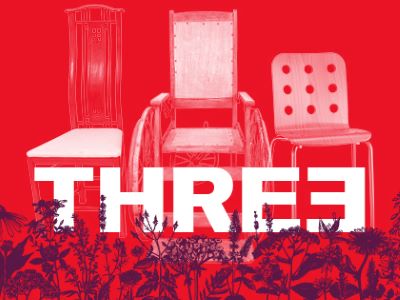A FASCINATING DIVERSE UPDATE
TO CHEKHOV’S THREE SISTERS
In 1900, Anton Chekhov wrote the play Three Sisters, centering around siblings both very similar and remarkably different who grew up in Moscow but now reside out on a country while longing to return to the more exciting lives they led in the big city. Told over four acts taking place chronologically, sisters Olga, Masha and Irina deal with relationships and careers that ebb and flow, with each sister constantly wondering how to best live their life to the fullest, even in the most difficult of times. Husbands, their father, friends and army officers come and go as the world around them changes faster than any of them can fathom.
Hayden Bishop, Tracey A. Leigh, Rachel Sorsa, and Alberto Isaac
Eric B. Anthony, Robert Almodovar, and Hayden Bishop
Keeping dialogue in a Chekhovian manner, playwright Nick Salamone’s world premiere update Three takes the sisters (Emily Kuroda as Olga, Rachel Sorsa as Masha, and Hayden Bishop as Irina) on a journey from the end of World War II in 1946 at a fictional isolated army base in America’s Midwest, through the beginning of the AIDS/Reagan era in 1982, to the aftermath of the Oklahoma City bombing in 1995, and ending in the present day, as the world is shell-shocked from COVID, war, and Trump. But the audacious concept, which Salamone calls “A Queer Meditation”, has the characters age only five years over about 80 years. Additionally, some of the original 19 roles have been completely changed or excised altogether, with some in the 10-member ensemble playing more than one role. This can be a bit confusing, especially if you aren’t familiar with Three Sisters, but in the end Three brings modern times and situations to the stage, giving voice to the concerns of racial and sexual inequalities in the face of finding your place in society by developing a backbone to speak your truth and knowing your worth as a person.
Tracey A. Leigh and Rachel Sorsa
Along the way to current times, as the sisters attempt to make the most of their lives, their Uncle Kapilling (Alberto Isaac) encourages them to face their trials and tribulations by singing “Ta-ra-ra Boom-de-ay” — a popular turn-of-the-century song — to remind them, “Why Worry? Be Happy!” Perhaps it is his dementia and the booze talking, but each time the song is sung, it does remind us that “this too shall pass” so just sing a silly song and get on with it. After all, fate will always turn the page when you least expect it.
Hayden Bishop, Alberto Isaac, and Eric B. Anthony
A frequent visitor is Amelia (Tracey A. Leigh), an Army officer of color whose blooming personal fortitude opens the eyes of the men in power who look down their noses at her during and after World War II. Amelia will eventually become a lover to Masha, who is married to the older, ineffectual schoolteacher Kulilgan (Robert Almodovar), of whom she has grown bored. Another visitor is a friend, Freddy (Eric B. Anthony), who will bring the horrors of AIDS — which decimated the lives of so many in the Reagan era — into the sisters’ home (kudos to the uncredited make-up artist who realistically adorned Anthony’s body with rosy KS lesions).
Emily Kuroda (center) and the cast of THREE
The sisters’ anguished brother Andrei (James Liebman) finds himself stuck in a marriage he never really wanted to the controlling Natasha (an outrageously strong Rebecca Metz), who fancies herself as not only the family’s matriarch but also of the country estate where the entire family lives together. Finally, there is the Baron Tuzenbach (Clay Storseth), a German so-called nobleman in unrequited love with Irina who hangs out there since it appears he has nowhere else to go or the funds to support himself.
“Ta-ra-ra Boom-de-ay” indeed!
James Liebman and Alberto Isaac
Hayden Bishop, Eric B. Anthony, and Alberto Isaac
In the very intimate in-the-round Davidson/Valentini Theatre director Jon Lawrence Rivera, Artistic Director of Playwright’s Arena — co-producing with the Los Angeles LGBT Center — does some of his best work, navigating his mighty actors in cramped quarters while opening us up to the world. The actors portray their characters with a nod to Chekhov, but occasionally the physical over-acting style seems more out-of-place to the story than sincere. The outstanding production team includes Lily Bartenstein (scenic, projection, prop designs), Matt Richter (lighting design), Jesse Mandapat (sound design), Mylette Nora (costume design), Raul Staggs (casting director), Letitia Chang (stage manager), and Zach Davidson (producer).
Hayden Bishop, Emily Kuroda, and Rachel Sorsa
With a run time of 2 hours and 30 minutes (including an intermission), it’s a long road, but Salamone has added to his gorgeous languaging several tasty bits and quips to generate well-deserved laughter that breaks the tension. Once you get settled into Salamone’s approach, you’ll find this homage is still the great Russian dramatist’s play, a human and humane account of characters mired in boredom, disappointment, failure, loneliness, and frustration. I daresay this beautifully acted and staged revival should make believers even out of those playgoers who avoid Chekhov as a tiresome purveyor of ineffectual people wallowing in ineffectual lives.
And in the words of playwright Salamone, “I hope people are self-reflective about what’s possible in their lives. I want people to think that no matter how much I’ve settled, tomorrow I can change this. I can say wait, life is worth living.” To that I add, now go out and make it so.
Rachel Sorsa, Hayden Bishop, and Eric B. Anthony
photos by Zev Rose Woolley
Three
Playwrights Arena and the Los Angeles LGBT Center
Davidson/Valentini Theatre at the Lily Tomlin/Jane Wagner Cultural Arts Center
L.A. Gay and Lesbian Center, 1125 N. McCadden Place in Hollywood
Fri, Sat and Mon at 8; Sun at 7
ends on March 18, 2024
for tickets ($20-$39), visit L.A. Gay Center
pay-what-you-choose seats available at select performances

